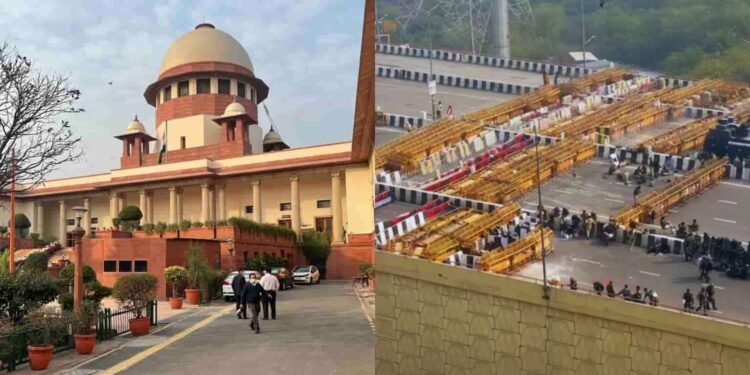The Supreme Court on Monday dismissed a Public Interest Litigation (PIL) filed by Gaurav Luthra, an RTI activist from Punjab, which sought action against the blocking of national highways by farmers protesting at the Shambhu border between Punjab and Haryana. The PIL aimed to challenge the disruption caused by the farmers’ protests, particularly the blockade of highways and railway tracks.
A Division Bench comprising Justice Surya Kant and Justice Manmohan noted that a similar PIL was already pending before the Court. This PIL concerned the ongoing farmers’ protests, and the Court had already constituted an expert committee to address the farmers’ grievances. The bench remarked, “Why was this plea filed? It gives a wrong impression. We have taken some initiatives, and despite that, you come here,” about the steps already taken to deal with the protests.
The farmers have been protesting for legal guarantees on Minimum Support Price (MSP) for their produce, as well as loan waivers, among other demands. Their protests have led to disruptions, including road blockages, as they continue to press for their demands.
Luthra, in his petition, argued that the state of Punjab was being targeted by foreign and anti-national forces, attempting to destabilize the region by using farmers and farmer unions as pawns. He called for the Shambhu border to be opened at least once a week for public convenience, as the ongoing blockade had severely affected the daily lives of commuters.
The Court pointed out that while farmers’ grievances were being dealt with by the expert committee, the petitioner had not utilized the proper legal channels to address the issues raised by commuters. The bench emphasized that PILs should not be filed for publicity and that such matters should be handled through the mechanisms already in place. “While the petitioner may feel strongly about content which is being aired by the private respondent… as containing scenes which are abhorrent or obscene to decency and morality and thus violating the Programme Code, yet whether it is obscene and indecent has to be tested by the three-tier mechanism which has been prescribed under the Act of 1995 and the Rules of 1994,” the Court noted, suggesting the petition’s focus was misdirected.
The petition also alleged that the blockade was a result of external forces trying to create instability in Punjab, but the Court did not find merit in this claim. The Court also took issue with the petitioner’s argument, stating that the issues were already being addressed in the ongoing case. “He is not the only conscience keeper of society. Do not file such petitions… we do not want to add matters to the one already pending,” the Court remarked.
Ultimately, the Court dismissed the PIL, allowing the petitioner the liberty to assist in the pending case on the same subject. The Court made it clear that it would not entertain additional petitions on the same issue. “There is already one PIL pending on the same subject. We will not entertain more petitions on the same issue,” it ruled while granting the petitioner the opportunity to assist the Court in the ongoing matter.

















